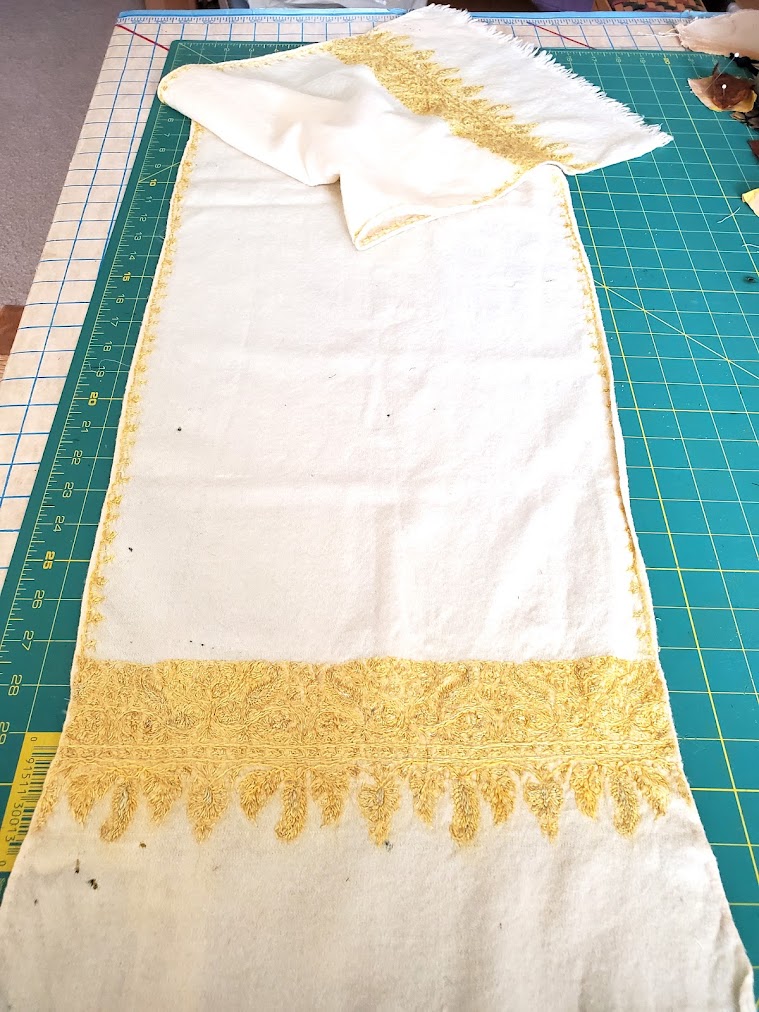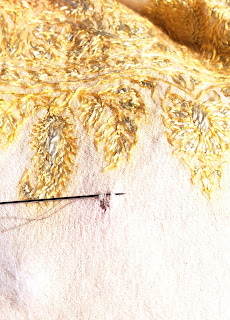My dear friend, Lynn, gave me this antique lambswool scarf many years ago. It had more than a few moth holes, and she didn't want it any longer. "I know you can do something with it", she told me. But I didn't do anything with it at all. At least, not immediately. This beautiful scarf, ornately hand-embroidered with silk threads, languished in my textile collection, waiting for something to be done with it.
With the press of the holidays behind me now, I've been busy reorganizing my work studio. I came across the lambswool scarf and a pang of guilt hit me. "I should do something with this", I thought. But there were those holes, so many infernal holes. Maybe I could incorporate pieces of the scarf into another project, perhaps a textile collage? Then my focus was drawn to the exquisite, intricately stitched embroidery. Countless hours of highly skilled effort produced those elegant designs nearly a century ago. It seemed criminal to cut up this lovely piece of textile history. My thoughts shifted to how I could repair the damaged areas of the scarf and restore it to its original function.
I've mended many pairs of wool socks and chunky sweaters. But the fineness of this lambswool was another matter altogether. After consulting with the knowledgeable folks at Pacific Northwest Fibershed, I developed a mending strategy. First of all, I learned that lambswool, once popular for luxury goods in the early to mid twentieth century, is no longer easily sourced. Very fine alpaca roving was recommended as a suitable substitute. Fortunately I found a bit of cream colored alpaca roving at a local fiber shop. I was advised to felt the roving into the voids of the lambswool. This required the construction of a thread matrix, something that the roving could attach itself to in the felting process.
Out came my silk threads and the finest embroidery needle I had. I gently stitched a grid over each hole in the scarf. Patience, patience, patience! Now for the roving. I pulled narrow strands of the alpaca fibers and rolled them into a very small wad, then ever so carefully, plunged my narrowest felting needle down into the roving and through the stitched grid, over and over. It was a delicate process and I'm sure I held my breath while working the first hole. To my relief, the results of the first mend looked pretty good. Encouraged, I continued the process.
After all the mending was finished, I washed the scarf by hand and air dried it. Evidence of my repair job is scarcely noticeable! It gives me great pleasure to have restored this scarf to usefulness. The lambswool is unbelievably soft and warm, and the lustrous embroidery elicits admiring comments. I hope my scarf project will convince you to consider salvaging a garment in need of some TLC rather than tossing it out. By the way Lynn, if you read this, no you don't get the scarf back. It's mine for keeps!





